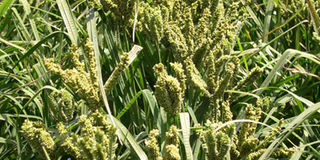Brief news on farming and agribusiness from around the country

A group of scientists have developed the resilient Maseno range of maize varieties and finger millet in a 16-year research. FILE PHOTO | NMG
What you need to know:
- According to the professor, the country suffers close to Sh6.7 billion in losses because of the striga weed destruction.
- The university plans to link up with Kenya Seed Company and make the seeds in bulk for the farmers.
- Mr O’Neill said Kenya would learn a lot from Ireland. The country has transformed its agri-food industry into one of the most advanced in the world
- The Sh659 million six-year CBPP study was funded by the International Development Research Centre, a Canadian aid organisation. Other major partners in the project included Kalro and the International Livestock Research Institute.
University produces seeds that can resist striga weed
Farmers may soon put increase their maize, sorghum and millet yields following the development of hybrid seeds that are resistant to the the striga weed menace.
Prof Matthew Dida Otieno, who led a group of scientists develop the Maseno EH10, EH11, EH13 and EH14 maize variety in the 16-year-old research said it would a big relief to farmers. The finger millet developed is known as 60D.
Prof Dida said the seeds have natural component, which fights the destructive weed.
“Compared to ordinary seeds, ours have the capacity to suppress the growth of the weeds,” he said.
With the hybrid resistance seed, a farmer is assured of five tonnes of yield per acre, and not a tonne, the researcher added. The new varieties take shorter time to mature.
“The maize takes 120 days to mature. The new seeds work best in the western region,” he said.
According to the professor, the country suffers close to Sh6.7 billion in losses because of the striga weed destruction.
“When the weed invades maize or sorghum farm, it attaches itself to the plants, sucking all the nutrients. The weed also poisons the plants. It usually hides the soil and no amount of weeding can eradicate it,” he said.
The university plans to link up with Kenya Seed Company and make the seeds in bulk for the farmers.
Prof Dida urged farmers to buy the new seeds once they are in the market.
—Elizabeth Ojina
****
Trip to boost Irish-Kenya ties
KENYA HAS made a step in improving agriculture ties with Ireland, with the two countries organising trade visits.
This Saturday, Trade Principal Secretary Chris Kiptoo leads a delegation of agribusiness leaders and government officials to the European country.
“The delegation is made up of government officials, companies and associations involved in the agri-food industries. It includes stakeholders of the potato project in Nyandarua County,” Dr Vincent O’Neill, the ambassador of Ireland to Kenya, said.
Mr O’Neill said Kenya would learn a lot from Ireland. The country has transformed its agri-food industry into one of the most advanced in the world.
“The delegation will also work on developing business and institutional links between Kenya and Ireland in relation to potatoes, fresh produce and tea and coffee,” he said.
Dr Kiptoo and his group are expected to take part in a “Doing Business in East Africa” event organised by Enterprise Ireland.
“The visit will focus on the importance of agriculture to the Irish economy. The Kenyan delegation will also learn lessons on the support provided by government agencies that facilitated this,” said Mr O’Neill said.
—Rachel Kibui
****
Agency launches vaccine
Scientists have launched a vaccine against the deadly bovine pleuropneumonia livestock lung disease.
The CBPP vaccine is about 80 per cent effective. The Kenya Veterinary Vaccines Production Institute said it would license the commercial production of the vaccine which is expected to be in the market in 12 months.
Studies show that the disease kills more than 24 million cattle in Sub-Sahara. In Kenya, most of the deaths occur in the arid and semi-arid counties.
Dr Hezron Wesonga, a scientist at the Kenya Agricultural Livestock and Research Organisation said the vaccine will be a relief to livestock farmers and the country in general.
The Sh659 million six-year CBPP study was funded by the International Development Research Centre, a Canadian aid organisation. Other major partners in the project included Kalro and the International Livestock Research Institute.
“The vaccine can tolerate high temperatures. It can also reduce number of severe reactions compared to the old one,” Dr Wesonga said. “It is 10 times cheaper than the old one and can withstand harsh transport environments.”
The scientist added Kalro would put in place the necessary regulations before commercialising the vaccine.
Kevapi chief executive Jane Wachira said her organisation would work with the department of Veterinary Services and county governments to ensure farmers get the vaccine. Dr Wachira said the country uses 13 vaccines and CBPP would be the fourteenth.
Dr Jemimah Njuki, a specialist in charge of agriculture and food security at the IDRC, said smallholder livestock farmers in Africa incur losses of up to Sh200 billion annually due to animal diseases.
—Leopold Obi





